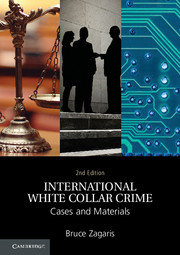Book contents
- Frontmatter
- Contents
- Preface
- 1 Introduction
- 2 Taxation
- 3 Money Laundering and Counterterrrorism Financial Enforcement
- 4 Transnational Corruption
- 5 Transnational Organized Crime
- 6 Export Control and Economic Sanctions
- 7 International Environmental Crimes
- 8 International Securities Enforcement
- 9 Extraterritorial Jurisdiction
- 10 International Evidence Gathering
- 11 Extradition and Alternatives
- 12 International Prisoner Transfer
- 13 The United Nations
- 14 The World Bank Group
- 15 INTERPOL
- 16 Economic Integration and Business Crimes
- Index
- References
9 - Extraterritorial Jurisdiction
Published online by Cambridge University Press: 05 November 2015
- Frontmatter
- Contents
- Preface
- 1 Introduction
- 2 Taxation
- 3 Money Laundering and Counterterrrorism Financial Enforcement
- 4 Transnational Corruption
- 5 Transnational Organized Crime
- 6 Export Control and Economic Sanctions
- 7 International Environmental Crimes
- 8 International Securities Enforcement
- 9 Extraterritorial Jurisdiction
- 10 International Evidence Gathering
- 11 Extradition and Alternatives
- 12 International Prisoner Transfer
- 13 The United Nations
- 14 The World Bank Group
- 15 INTERPOL
- 16 Economic Integration and Business Crimes
- Index
- References
Summary
Introduction and Hypotheticals
Globalization, the information revolution, and the proliferation of free trade have facilitated the spread of transnational crime, including white collar crime. As the geographical reach of crime has expanded, so too have the efforts of governments to expand jurisdiction over crimes with international elements. This chapter examines the bases for extraterritorial jurisdiction, especially as they relate to white collar crime, and various mechanisms used to limit the inevitable conflicts that arise from concurrent assertions of jurisdiction. This chapter also discusses limitations on the power to enforce and adjudicate related to the immunities of states, diplomats, consuls, international organizations, and their officials.
National criminal law is based on the principle of territorial sovereignty of the state. This principle requires courts within a particular state to apply its criminal law, whereas in civil or commercial cases domestic courts sometimes apply foreign laws. The inability of domestic courts to apply foreign law in criminal cases makes jurisdictional conflicts more important and more difficult to resolve. In the same vein, the potential for diplomatic conflicts when other states are denied the ability to assert their criminal jurisdiction is much greater than in civil cases.
When analyzing trends in national criminal jurisdiction, it is useful to distinguish among the following categories: (1) jurisdiction to prescribe (also referred to as legislative jurisdiction), (2) jurisdiction to enforce (or executive or enforcement jurisdiction), and (3) jurisdiction to adjudicate.
Hypothetical 1: You are an Assistant District Attorney in New York City. The District Attorney has asked you to advise on jurisdictional issues related to a series of transactions involving the family that owns Banco Grande (BG), a prominent financial institution in the Latin American state of Venecolomador. The family has prominent political connections with the government of Venecolomador. The District Attorney has received evidence suggesting that, between January 2002 and December 2004, BG helped high-net-worth individuals evade currency exchange controls and move money out of Venecolomador using BG branches in the Bahamas and the Cayman Islands. In addition, the District Attorney believes that BG paid off officials in the Venecolomador government to ensure that bank inspectors would not uncover irregularities. The illicit payments may have been approved at a BG board meeting in Venecolomador, in which Mr. Executivo, a board member, participated by phone from his office in New York.
- Type
- Chapter
- Information
- International White Collar CrimeCases and Materials, pp. 319 - 364Publisher: Cambridge University PressPrint publication year: 2015



